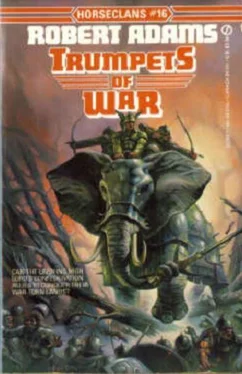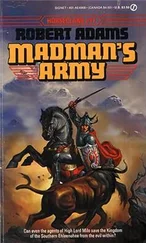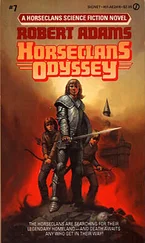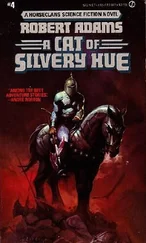And that army was kept constantly busy, riding and marching hither and yon, usually in small units, for years, trying to put down a rebellion that never really died, despite the loss of the flower of its army at Ahrbahkootchee and the flight into exile of many of the rest, including its charismatic leader, Thoheeks Zastros. But it then seemed that as fast as one head of the rebellion was severed, two or three more sprang up into full life in as many distantly separated spots around the far-flung thoheekseeahnee that made up the Kingdom of the Southern Ehleenohee .
Not only were the soldiers, troopers and their officers all overworked throughout these difficult years, but with conditions in the capital at Thrahkohnpolis in utter turmoil following the death of the old king and the contested accession of his son, the troops were no longer in any manner well cared for, often having to forage the areas through which they marched, even pillage, in order to keep themselves and their animals fed and clothed and equipped, having to strip dead or wounded rebels for arms and armor to replace their own battered or broken gear, taking remounts at swordpoint, war-trained or no, whenever and wherever they could find them in the suffering lands. And naturally in such an army in such condition, desertions were common, with scant hope of replacements.
Then, in a manner often afterward questioned but never yet explained, the new king, Hyamos’ son, and his entire family had suicided for no apparent reason, some of them doing so before unimpeachable witnesses, all in
a single day and night, leaving no direct-line heirs to take the now-vacant throne and grasp the loose, dangling reins of the kingdom now virtually reeling about in a state of near-anarchy. That had been when a former-rebel thoheeks, who had managed to purchase a full pardon of King Hyamos after the debacle at Ahrbahkootchee, one Fahrkos Kenehdos of Bahltoskeera, which triple duchy abutted the royal lands, marched in with an overwhelming force scraped up who knew where and first seized Thrahkohnpolis, then had himself crowned king.
King Fahrkos had summoned all units of the widely dispersed Royal Army back to Thrahkohnpolis and then had set about purging it of any and all officers who had remained loyal to their king and their oaths during Thoheeks Zastros’ disastrous rebellion, replacing them with a host of rebels. Because of his intemperate, vengeful actions, a large proportion of the Royal Army simply rode or marched away, some in whole units, some piecemeal. Nor did those troops who stayed make any move to stop their old comrades, though they did prevent King Fahrkos’ rebel forces from interfering with or interdicting the departures.
Of course, not one thrahkmeh of the long-overdue back pay had been proffered or collected by any officer, soldier or trooper, so by the time that Squadron Captain Stehrgiahnos and his few hundred officers and troopers finally rode onto his ancestral lands, they were become a force of de facto bandits, simply in order to survive the course of the long, hard journey.
Their arrival was timely, to say the least. A relatively small band of rebels were besieging the hold of the komees, which hold had been fighting off attacks and slowly starving for some weeks. However, although possessed of slightly larger numbers, most of these rebels were at best amateurs at real warfare, and the tough, professional warriors of Stehrgiahnos went through them like a hot knife through butter, killing or wounding more than half of them, capturing their camp and baggage and loot, and chasing the survivors of the fight like so many hunted deer, coldly butchering those they managed to catch and so horrifying the rest that many of them ran their horses to death or near it, then staggered on until they fell of utter exhaustion miles from the hold they had sought to take, having along the way discarded anything and everything that might weigh them down or retard their flight. Many a man of these wished to have kept at least a spear or a sword when found by the farmers and villagers he and his band had been robbing and abusing during recent weeks.
Stehrgiahnos had entered the hold to find that he now was komees, his sire having died of a wound taken in one of the earlier attacks, his crippled brother, Hohrhos, and the elderly castellan, Behrtos, having ordered the defense masterfully, despite the many things they had lacked and the few ill-trained effectives they had commanded.
As soon as affairs permitted, he had closeted himself with his twin. “Hohrhos, this was bad enough, but I think it to be only the bare beginning, and it will assuredly get worse as it progresses. That rebel bastard Fahrkos has had himself crowned king, and the army is deserting him in droves for good and sufficient cause. Soon there will be no army worthy of the name in all of the kingdom; then all hell is certain to break loose on us, and this hold is indefensible for long and against any really strong force, especially against one whose commander might know what he is about.
“Therefore, I think we should abandon the hold, strip it of all usable or valuable and move into the city. With my men and the folk already resident, plus those from the countryside who’re sure to seek shelter with us, we should be able to hold those walls against most any force we’re likely to see away out here in the far provinces. We can start collecting supplies of all sorts, weapons, armor, horses and mules, kine of all kinds. . . .” He noted his twin’s frown and asked, “What’s wrong with the plan?”
“With the plan, nothing,” sighed Hohrhos. “It’s the city. We don’t own the City of Pahtahtahspolis anymore, my lord brother.”
“Have you gone mad of siege fever, Hohrhos?” demanded the new komees, “What the hell are you talking about? Of course we own the City of Pahtahtahspolis, it’s part of my patrimony, it’s been a part of this komeeseeahn since the very beginning of our house, time out of mind!”
“Well, maybe so, but it’s not ours anymore, my lord brother,” said his crippled twin brother flatly. “The Church owns it now, it and its plowlands and pastures.”
Stehrgiahnos had never known his brother to lie about anything of importance, and he just then felt as if an iron mace swung by a giant had crashed against his battle-helm. “But . . . but, how . . . ?”
There was a bare trace of bitterness in the cripple’s voice then as he said, “Your damned promotion after Ahrbahkootchee, my lord brother, that’s how! Our sire didn’t have that kind of money, not the amount you needed, but he was hungry for the honor for you, for him and for the House of Papandraios, so he rode up to the thoheeks and tried to borrow it, but the thoheeks didn’t have it either, and it was he suggested that our sire seek out the kooreeos, and he did, ending by mortgaging the city and its lands to the Church for enough to buy you that blasted promotion and outfit you properly for your new rank and status. Even 1 approved of what he did . . . then.
“But after that, ill luck dogged us. One year, a drought made the crop yields skimpy. The next year, the rains came too soon and too heavy. Then there was trouble on the land, with rebels and bandits—I can’t see much difference between the two stripes, if there is any—trampling grain fields and driving off livestock and raping and looting in the villages.
“What it boils down to, my lord brother, is that our sire could not manage to pay the enormous interest on time, much less touch upon the principal, so six months or so back a sub-kooreeos and a detachment of hired pikemen marched into the komeeseeahn, served our sire with a document signed by the a hrkeekooreeos in Thrahkohnpolis, the kooreeos of this duchy and our own dear thoheeks, then entered the city and occupied it, claiming everything of ours in it.”
Читать дальше












